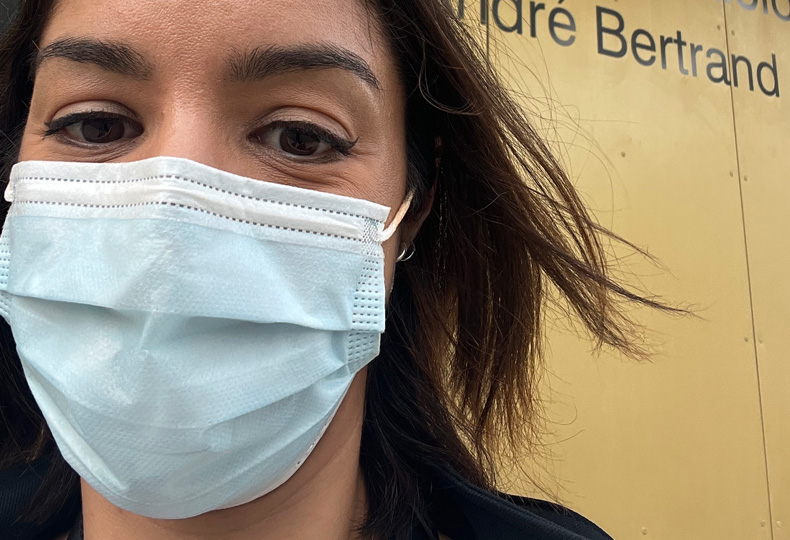When biology leads to medicine and medical research in infectious diseases

A look back at a remarkable career!
What is your background?
I come from Alençon, in Normandy. After two years of BCPST preparatory class at the Lycée Henri IV, I was admitted to ENS Paris-Saclay (2007-2011). I did the Master 2 in Epidemiology (currently EPIPOP - Faculty of Medicine Sorbonne University), then the Master in Public Health, specialising in "Infectious Risk" at the École Pasteur/CNAM/EHESP (Pr Fontanet).
I had the chance to prepare my thesis - defended in 2014 - on the "care of people living with the human immunodeficiency virus in a decentralised area in Cameroon"" under the supervision of Pr Éric DELAPORTE, one of the major actors of the One Health dimension and interdisciplinary approaches in health in France
Within the framework of the ENS Paris-Saclay diploma, we had a transversal teaching unit of pedagogy, during which I proposed the "biostatistics" course, an introduction to statistics for health, which was created with the support of the Biology department, and still exists today
During my thesis, I was able to benefit from a monitorate shared between the Faculty of Medicine of Montpellier and the Biology Department of ENS Paris-Saclay.
I entered the Faculty of Medicine of Montpellier in 2013 in DFGSM3 (Diplôme de Formation Générale en Sciences Médicales) by the passerelle at the beginning of my third year of thesis and continued for 2 years) the UE of biostatistics, before devoting myself to the preparation of the ECN (Épreuves Classantes Nationales) of the internship. I was lucky enough to be very well ranked (18/8.372) and to be able to choose the newly created specialty of "Infectious and tropical diseases".
I have just finished my internship, having defended my thesis in 2021 on a little-known tropical parasitosis, Loa loa, and having defended my speciality thesis (DES) this year.
Throughout my residency I was a lecturer in preparation for residency at the University of Montpellier, for infectious diseases and critical reading of articles, i.e. about twenty evening lectures per year. I also have excellent memories of this, and now I am involved in teaching externs and interns in several university diplomas (DU - Anti-infectious strategies, Extra-hospital Infectiology and Tropical and Mediterranean Medicine - International Health).
What is your position today at the Montpellier University Hospital?
I am lucky enough to remain in the "Infectious and Tropical Diseases" department (MIT) of the Montpellier University Hospital, on a CCU-AH Inserm Bettencourt position (4 financings/year, all specialities and cities combined, reserved for holders of a science and medicine thesis) which allows me to have time dedicated to research.
I keep an activity of consultation, telephone advice in anti-infectious strategy and on-call duty without having the management of hospitalization, which allows me to devote myself to my academic activities.
You are also the director of the training axis in the exposUM institute. What are the tasks of this institute?
In 2021, still under the mentorship of Prof. DELAPORTE, I coordinated the University of Montpellier's response to the call for projects "Excellence in all its forms" of the future investment programme (PIA4), which we obtained. This led to the creation of the exposUM institute (Institut de l'exposome de l'université de Montpellier), a project dedicated to the study of external and environmental factors capable of affecting human health.
ExposUM's mission is to federate the strengths of the Montpellier site around three challenges: "Feed Protect and Care", based on the themes of the exposome (1) and "One Health" (2), with a definite infectious diseases focus and an openness towards the South, which is also part of the UM's identity.
In this institute, there are three main pillars: research, society and teaching. I am lucky enough to be in charge of the training axis. This axis aims to promote transdisciplinarity (i.e. not exclusively medicine and science), mainly at the doctoral level, within the University of Montpellier in order to improve training in human health in relation to the environment in the broad sense.
Are you also pursuing your research? What is it about?
The main subject of my research work is the emergence of antibiotic resistance in the South, in relation to the environment and the animal world, in a One Health approach. It enabled me to obtain grants from the SPILF (3) and the Société Française de Microbiologie (SFM) and my position at the CCU-AH Inserm Bettencourt.
I am also interested in emerging viral infections and neglected tropical diseases, always with a focus on the interface, and on the interface of the South.
(1) The exposome (Wild, 2005) is a concept corresponding to the totality of exposures to environmental factors that a human organism undergoes from conception to the end of its life, complementing the effect of the genome.
(2) One Health: The One Health initiative is a movement created in the early 2000s that promotes an integrated, systemic and unified approach to public, animal and environmental health at local, national and global levels. It aims in particular to better deal with emerging diseases with pandemic risks.
(3) SPILF: the Société de Pathologie Infectieuse de Langue Française is the learned society of French infectious diseases. It is an association under the French law of 1901 bringing together health professionals interested in infectious and tropical diseases.
